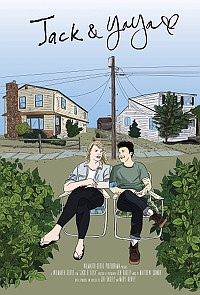| SHADOWS ON THE WALL | REVIEWS | NEWS | FESTIVAL | AWARDS | Q&A | ABOUT | TALKBACK | |||||||||||||||||||||
 Shadows off the beaten path Shadows off the beaten pathIndies, foreign, docs and shorts...
On this page:
ASK ANY BUDDY |
JACK & YAYA |
KEYBOARD FANTASIES
| |||||||||||||||||||||
| See also: SHADOWS FILM FESTIVAL | Last update 30.Mar.20 | |||||||||||||||||||||
|
Ask Any Buddy Review by Rich Cline | 
| |||||||||||||||||||||
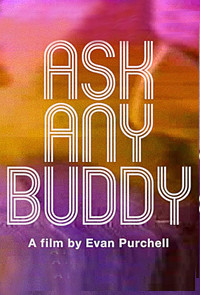 dir-prd Evan Purchell with Casey Donovan, Al Parker, Jack Wrangler, Peter Berlin release UK Mar.20 flare 19/US 1h18  |
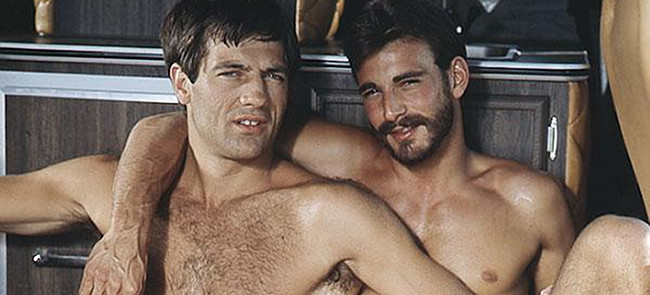 A feature based on the eponymous Instagram feed, this cinematic collage uses clips from 125 theatrical movies from 1968-1986, creating a fascinating depiction of gay life between Stonewall and the Aids epidemic. This isn't about realism, it's about how filmmakers depicted the lifestyle on-screen. Editing together pornographic films that were shot in real-life locations, filmmaker Evan Purchell creates an unusual documentary portrait of the subculture as it expressed its sexual freedom. The film opens with the disclaimer: "For your enjoyment, do not try to understand this film; there is nothing to understand". What follows is a cleverly assembled collection of clips that depict how gay men lived in this free-spirited period. Filmmaker Purchell uses some very explicit footage to reveal private lives as guys go cruising in New York's piers, clubs and trains. It's a kaleidoscope of desire featuring young men with fluffy hair, bold moustaches and very tight jeans, plus snippets of hilariously arch dialog. These scenes are shot on grainy film, strikingly well photographed by filmmakers from Joe Gage to Peter de Rome. Dramatic scenes feature men in relationships, but most centre on the nature of attraction, an animal magnetism that's very difficult to resist. Yes, it's all hyper-sexualised, seen through the eyes of men who are looking for something instant. They're mainly young and fit, but vary in age and race, with an added subset of drag queens. And encounters range from mindless body contact to drug-fuelled spontaneity to warmly romantic. This is edited together to create a loose narrative structure that explores telling details about life in this place and time. In public spaces there are furtive glances, tentative touching and the continuous, exhilarating tension that they might be caught at any moment. There's also the visceral release of partying with like-minded people. The structure follows a range of male experiences to chronicle a period in time that has strong echoes to much deeper human longing. Indeed, the various aspects of the storytelling have a much more serious impact than expected. With this clever observation of both the free-love 1970s and the history of adult cinema, Purchell has created a vitally important document of a period unlike any time before or since. The editing is inventive and often very cheeky, as it were. In addition to the attitudes and a range of vivid characters, the collection captures on-screen a variety of notorious places, from bars and theatres to pride parades and bathhouses. And of course, since these are actual films from the 70s, they reveal the decade in a way that's much more powerful that any dramatic re-creation.
| ||||||||||||||||||||
|
Jack & Yaya Review by Rich Cline | 

| 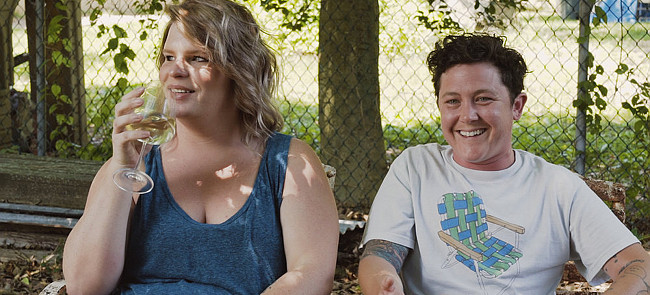 Exploring a friendship as it celebrates 30 years, this warm documentary takes a deeply personal approach, allowing people to be themselves as they speak and interact. Even though it feels somewhat random and overlong, the film has an offhanded slice-of-life quality as it recounts an extraordinary story with a strong sense of affection and humour. And along the way, some deeper universal themes emerge as well. Jack and Yaya met through the fence behind their South Jersey homes when they were only toddlers, never questioning that they were a boy and a girl, even though everyone else saw them as a girl and a boy. Jack came out as a gay teen before beginning his transition; Yaya's gay brother John inspired her to go into drag, and she never looked back. Now in their early 30s, teacher-artist Jack travels back from Boston to visit his hometown, where Yaya lives in her childhood home and works as a waitress. They never worried about their identities as children, but have issues on their minds today. The film is packed with terrific observations, such as how they felt that their childhood Christmas gifts were left at the wrong house. Jack's warmly engaged family life was much more secure than Yaya's, which was both strictly Catholic and economically precarious. Colourful relatives offer telling reminiscences about Jack and Yaya in the context of the merged dual-family history. And a terrific collection of snapshots and home-videos are a riot of ghastly 1980s haircuts and outfits. Jack and Yaya speak openly about how they teamed up to defend each other from bullies. Jack recalls rejecting girly things as a child, understanding that his life was going to be difficult long before he realised she was trans. Indeed, as children they never had a word for how they felt, but understood that there was a commonality between them, accepting it without question even as they had the sense that something was wrong. These kinds of pointed moments ad depth in between the lighthearted memories. It's important to hear that Jack's now super-supportive mother Jo Ann was initially disappointed when he came out, while his dad Tony was nonplussed. Yaya remembers her late mother's fear that her life would be impossible, refusing to accept her gender. While John talks openly about different relationships he's had with Yaya as a brother or sister. This extended group of messy people is a vivid reminder that loving each other is what matters. And having a best friend to share life makes a big difference.
|
| Keyboard Fantasies: The Beverly Glenn-Copeland Story Review by Rich Cline | 
| 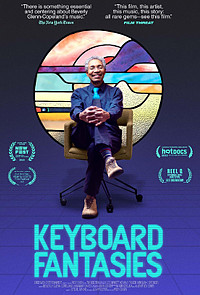 dir Posy Dixon prd Liv Proctor with Glenn Copeland, Jeremy Costello, Carlie Howell, Kurt Inder, Nick Dourado, Bianca Palmer, April Sudler, Charlie Bones, Don Thompson, Lezlie Lee Kam, Mike Hazard, Terry Brown release UK Mar.20 flare 19/UK 1h03 
| 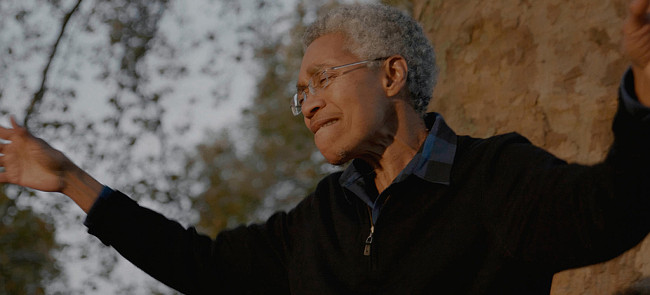 There's a loose approach to this documentary, which approaches issues of race and gender from the striking perspective of a black trans man who survived the tumultuous cultural climate of the 50s and 60s and, after gaining experience as a musician, recorded his now-iconic eponymous album in 1986. With a fluid style, director Posy Dixon lets the story unfold in a way that's powerfully moving. At 74, Copeland recalls a childhood as a black Quaker girl in Philadelphia with a piano-playing father and singing mother. So a future as a musician was pre-ordained. Never experiencing firsthand the racial problems of the times, Copeland moved to Montreal at 17 to study. Freed to live as a man, he started a relationship with a woman, which was illegal on multiple levels in 1961. His parents tried to have him institutionalised, but he dropped out of university and started writing music. Recording as Beverly, his first album explored the nature of love and death. Copeland recounts his story with good humour and the clarity of hindsight. Anecdotes are bracingly vivid, pulling the audience into the story with a strong emotional connection. While he chats to the camera, friends and colleagues share impressions in voiceover, accompanied by vintage snapshots, archive footage and colourfully artful new material. All of this is edited smoothly along with Copeland's velvety music, recounting events chronologically, which makes the story thoroughly engaging. It's fascinating to hear Copeland narrate how he recorded Keyboard Fantasies on cassette tape using an Atari computer to create electronic variations of instruments. The album was lost for some three decades, then rediscovered by a Japanese collector, leading to a record deal. Dixon follows Copeland as he gains media interest and heads off to meet fans on his first world tour. Working with the band Indigo Rising sparks his creative energies and gives him new life as a performer, singing his gorgeous songs while sharing his story. Copeland is refreshingly unbothered by his unusual life, still curious and creative, unbothered by how his experiences are a collision of unusual timelines and gender identities. Watching him relax on-stage, letting his music flow out of him and around the room is powerfully healing. His bandmate Nick thinks of him as someone out of time and place; his fans are mainly in their 20s. Perhaps it's because he exudes deep gratitude for the joy in his life and the people around him. This film is a tonic for a toxic time.
| 
See also: SHADOWS FILM FESTIVAL © 2020 by Rich Cline, Shadows
on the Wall
HOME | REVIEWS | NEWS | FESTIVAL | AWARDS
| Q&A | ABOUT | TALKBACK | | ||||||||||||||

